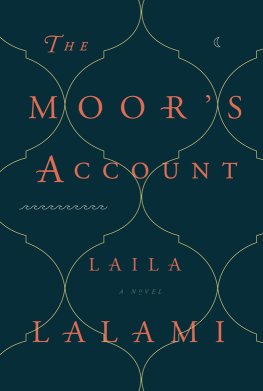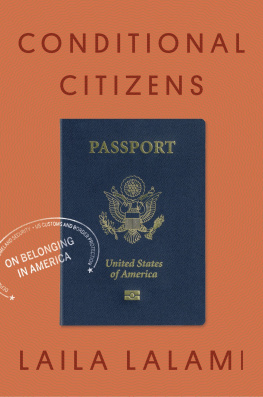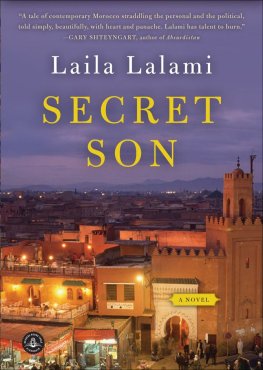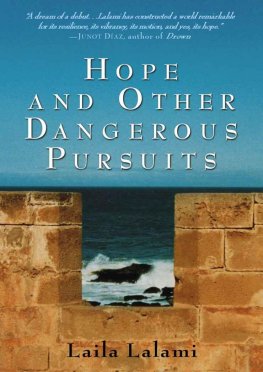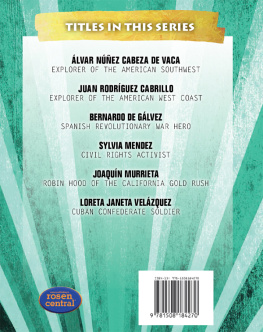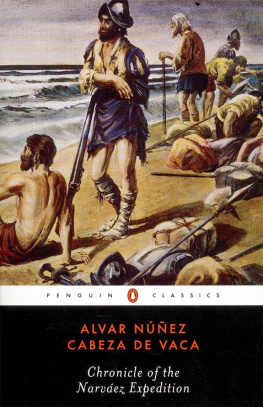Laila Lalami
The Moor's Account
In the name of God, most compassionate, most merciful. Praise be to God, the Lord of the worlds, and prayers and blessings be on our prophet Muhammad and upon all his progeny and companions. This book is the humble work of Mustafa ibn Muhammad ibn Abdussalam al-Zamori, being a true account of his life and travels from the city of Azemmur to the Land of the Indians, where he arrived as a slave and, in his attempt to return to freedom, was shipwrecked and lost for many years.
Because I have written this narrative long after the events I recount took place, I have had to rely entirely on my memory. It is possible therefore that the distances I cite might be confused or that the dates I give might be inexact, but these are minor errors that are to be expected from such a relation. In all other ways, I testify here that I have described these events as I have witnessed them, including those that, by virtue of their rarity, may seem to the reader to be untrue.
I intend to correct details of the history that was compiled by my companions, the three Castilian gentlemen known by the names of Andrs Dorantes de Carranza, Alonso del Castillo Maldonado, and especially lvar Nez Cabeza de Vaca, who delivered their testimony, what they called the Joint Report, to the Audiencia of Santo Domingo. The first was my legal master, the second my fellow captive, and the third my rival storyteller. But, unlike them, I was never called upon to testify to the Spanish Viceroy about our journey among the Indians.
I consider the three Castilian gentlemen I have mentioned to be men of good character, but it is my belief that, under the pressure of the Bishop, the Viceroy, and the Marquis of the Valley, and in accordance with the standards set by their positions, they were led to omit certain events while exaggerating others, and to suppress some details while inventing others, whereas I, who is neither beholden to Castilian men of power, nor bound by the rules of a society to which I do not belong, feel free to recount the true story of what happened to my companions and me.
What each of us wants, in the end, whether he is black or white, master or slave, rich or poor, man or woman, is to be remembered after his death. I am no different; I want to survive the eternity of darkness that awaits me. If, by a stroke of luck, this account should find its way to a suitable secretary, who would see fit to copy it down without any embellishment, save for those of calligraphy or, in the manner of the Turks and the Persians, colorful illumination, then perhaps, someday, if that is to be the will of God, my countrymen will hear about my wondrous adventures and take from them what wise men should: truth in the guise of entertainment.
1. THE STORY OF LA FLORIDA
It was the year 934 of the Hegira, the thirtieth year of my life, the fifth year of my bondage and I was at the edge of the known world. I was marching behind Seor Dorantes in a lush territory he, and Castilians like him, called La Florida. I cannot be certain what my people call it. When I left Azemmur, news of this land did not often attract the notice of our town criers; they spoke instead of the famine, the recent earthquake, or the rebellions in the south of Barbary. But I imagine that, in keeping with our naming conventions, my people would simply call it the Land of the Indians. The Indians, too, must have had a name for it, although neither Seor Dorantes nor anyone in the expedition knew what it was.
Seor Dorantes had told me that La Florida was a large island, larger than Castile itself, and that it ran from the shore on which we had landed all the way to the Peaceful Sea. From one ocean to the other, was how he described it. All this land, he said, would now be governed by Pnfilo de Narvez, the commander of the armada. I thought it unlikely, or at least peculiar, that the Spanish king would allow one of his subjects to rule a territory larger than his own, but of course I kept my opinion to myself.
We were marching northward to the kingdom of Apalache. Seor Narvez had found out about it from some Indians he had captured after the armada arrived on the shore of La Florida. Even though I had not wanted to come here, I was relieved when the moment came to disembark, because the journey across the Ocean of Fog and Darkness had been marred by all the difficulties to be expected of such a passage: the hardtack was stale, the water murky, the latrines filthy. Narrow quarters made the passengers and crew especially irritable and almost every day a quarrel erupted. But the worst of it was the smell the indelible scent of unwashed men, combined with the smoke from the braziers and the whiff of horse dung and chicken droppings that clung to the animal stalls in spite of daily cleanings a pestilential mix that assaulted you the moment you stepped into the lower deck.
I was also curious about this land because I had heard, or overheard, from my master and his friends, so many stories about the Indians. The Indians, they said, had red skin and no eyelids; they were heathens who made human sacrifices and worshipped evil-looking gods; they drank mysterious concoctions that gave them visions; they walked about in their natural state, even the women a claim I had found so hard to believe that I had dismissed it out of hand. Yet I had become captivated. This land had become for me not just a destination, but a place of complete fantasy, a place that could have existed only in the imagination of itinerant storytellers in the souqs of Barbary. This was how the journey across the Ocean of Fog and Darkness worked on you, even if you had never wanted to undertake it. The ambition of the others tainted you, slowly and irrevocably.
The landing itself was restricted to a small group of officers and soldiers from each ship. As captain of the Gracia de Dios, Seor Dorantes had chosen twenty men, among whom this servant of God, Mustafa ibn Muhammad, to be taken on one of the rowboats to the beach. My master stood at the fore of the vessel, one hand on his hip, the other resting on the pommel of his sword; the posture seemed to me so perfect an expression of his eagerness to claim the treasures of the new world that he might have been posing for an unseen sculptor.
It was a fine morning in spring; the sky was an indifferent blue and the water was clear. From the beach, we slowly made our way to a fishing village one of the sailors had sighted from the height of the foremast, and which was located about a crossbow shot from the shore. My first impression was of the silence all around us. No, silence is not the right word. There was the sound of waves, after all, and a soft breeze rustled the leaves of the palm trees. Along the path, curious seagulls came to watch us and departed again in a flutter of wings. But I felt a great absence.
In the village were a dozen huts, built with wooden poles and covered with palm fronds. They were arranged in a wide circle, with space enough in between each pair of homes to allow for the cooking and storing of food. The fire pits that dotted the perimeter of the clearing contained fresh logs, and there were three skinned deer hanging from a rail, their blood still dripping onto the earth, but the village was deserted. Still, the governor ordered a complete search. The huts turned up tools for cooking and cleaning, in addition to animal hides and furs, dried fish and meat, and great quantities of sunflower seeds, nuts, and fruit. At once the soldiers took possession of whatever they could; each one jealously clutched what he had stolen and traded it for the things he wanted. I took nothing and I had nothing to barter, but I felt ashamed, because I had been made a witness to these acts of theft and, unable to stop them, an accomplice to them as well.

